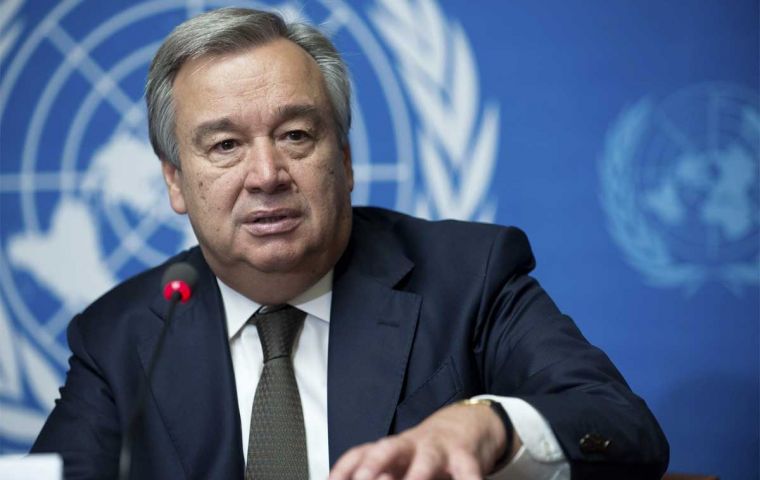MercoPress. South Atlantic News Agency
International community repudiates Ecuador's attack on Mexican Embassy in Quito
 Guterres also called on Ecuador and Mexico to “resolve their differences by peaceful means”
Guterres also called on Ecuador and Mexico to “resolve their differences by peaceful means” United Nations Secretary-General António Guterres and the governments of many countries in the Americas condemned Ecuador's decision to break into Mexico's Embassy in Quito on Friday to arrest former Vice President Jorge Glas, who had sought asylum in the diplomatic mission as he faced corruption charges.
Guterres argued that President Daniel Noboa's move jeopardized international relations and, for that, he was “alarmed.” He also recalled that diplomatic buildings and their personnel enjoyed ”a cardinal principle of inviolability (that) must be respected in all cases, in accordance with international law.“
The violation of this principle ”endangers the normality of international relations,“ he insisted as he called on Ecuador and Mexico to ”resolve their differences by peaceful means.”
After the assault on the Embassy, Mexican President Andrés Manuel López Obrador cut all ties with Quito. Earlier last week, Noboa's administration had declared the Mexican Ambassador persona non grata following statements from AMLO questioning the electoral campaign that led Noboa to power.
The Organization of American States (OAS) advocated for dialogue to ease the simmering tensions, stressing the importance of international treaties and the right to asylum.
US State Department Spokesman Matthew Miller called for a resolution that respects international norms and insisted that Washington regretted “any violation of the Vienna Convention on Diplomatic Relations and takes very seriously the obligations of countries under international law to respect the inviolability of diplomatic missions.”
Nicaragua also announced it was severing all diplomatic ties with Ecuador while many governments in the region joined the condemnations.
Argentina
“As a State Party to the 1954 Convention on Diplomatic Asylum, which has recently granted this status to Venezuelan political leaders and is awaiting the issuance of the corresponding safe conducts, the Argentine Republic joins the countries of the region in condemning what happened last night at the Mexican Embassy in Ecuador and calls for full compliance with the provisions of that international instrument as well as the obligations arising from the Vienna Convention on Diplomatic Relations,” read a statement from the Foreign Ministry in Buenos Aires.
Meanwhile, former President Cristina Fernández de Kirchner (CFK) wrote on X that “The events of public knowledge that took place at the Mexican Embassy in Ecuador constitute an unprecedented aggression in American territory that violates both international law and the historical tradition of the Republic of Mexico in terms of political asylum.”
“From that country was built the broad concept of the right of asylum, which not only saved the lives of Argentine men and women in the darkest moments of our recent history but also those of many citizens of the world,” she added.
“Our solidarity with the people of Mexico and its President.”
Uruguay
Montevideo too regretted the events in Ecuador, “which have affected relations between two sister nations, as well as respect for fundamental norms of international law and for peaceful coexistence between Latin American nations,” a Foreign Ministry statement stressed.
“Last March 28, on the commemoration of the 70th Anniversary of the Caracas Convention on Diplomatic Asylum, Uruguay highlighted the importance of this legal institute of a long tradition in Latin America and encouraged States to reaffirm and respect it. He also pointed out that this conventional source is ”closely linked to other fundamental instruments of international law for regulating relations between States, such as the 1961 Vienna Convention“, which enshrines the inviolability of diplomatic missions. This has been fundamental to guarantee the peaceful coexistence among nations, so its disregard is absolutely unacceptable,” the document went on.
“Respecting the Caracas Convention applies both to the territorial State and to the asylum-seeker, who must take special account of the cases in which diplomatic asylum should not be granted, including persons prosecuted for common crimes. However, there are mechanisms for handling these situations, which in no case justify forcible entry into the diplomatic mission,” President Luis Lacalle Pou's administration also noted.
Paraguay
In Asunción, Paraguay's Foreign Ministry issued a statement on Saturday expressing its concern over the events at the Mexican Embassy in Ecuador.
“Paraguay observes with deep concern the latest events occurred with the Embassy of Mexico in Ecuador. It calls for reflection to the parties and the unrestricted respect of International Law,” the communiqué underlined.
“Paraguay observes with deep concern the latest events at the Embassy of Mexico in Ecuador. It calls for reflection to the parties and the unrestricted respect for International Law,” Asunción's diplomatic agency also said on X.
Brazil
The government of Luiz Inácio Lula da Silva condemned “in the strongest terms” the measure taken by the Ecuadorian government in “clear violation” of international conventions that establish that “the premises of a diplomatic mission are inviolable.” Itamaraty also said the military storming of the mission constitutes a “serious precedent” that deserves “energetic repudiation.”
”All my solidarity with President and friend (Andres Manuel) Lopez Obrador,“ President Lula wrote on X.
Venezuela
In Caracas, the Venezuelan Foreign Ministry said in a statement that Glas was captured ”illegally“ after being granted asylum from Mexico. Noboa's move was evidence ”of the atrocious persecution of which he has been a victim,“ the administration of President Nicolás Maduro argued.
”All this constitutes an action that not even in the most atrocious dictatorships in the region, such as that of Augusto Pinochet in Chile or Jorge Rafael Videla in Argentina, have been recorded,” Foreign Minister Yván Gil added.
Also condemning Ecuador's actions were Bolivia, Honduras, Cuba, Chile, Costa Rica, Panama and the Dominican Republic.




Top Comments
Disclaimer & comment rulesCommenting for this story is now closed.
If you have a Facebook account, become a fan and comment on our Facebook Page!